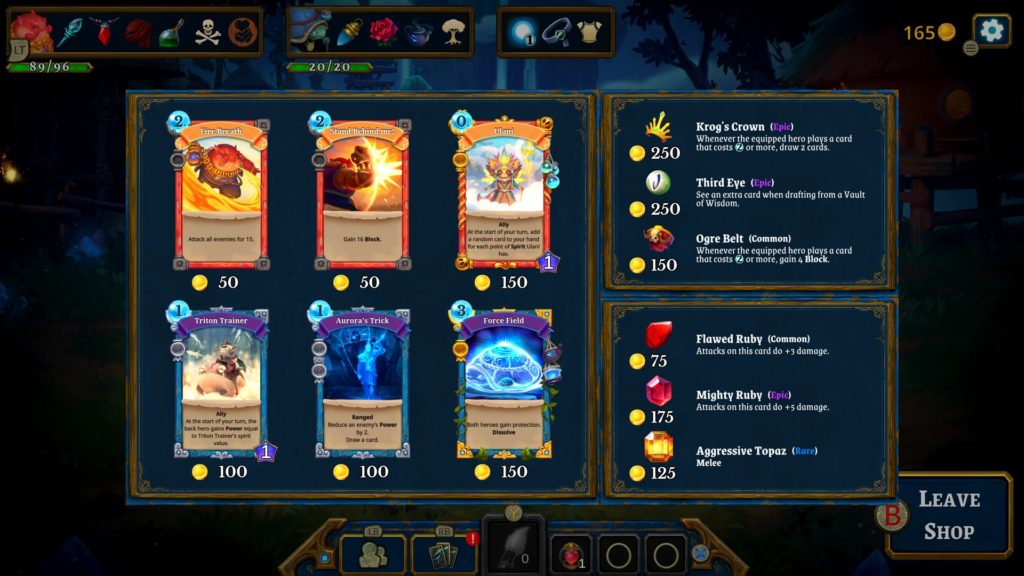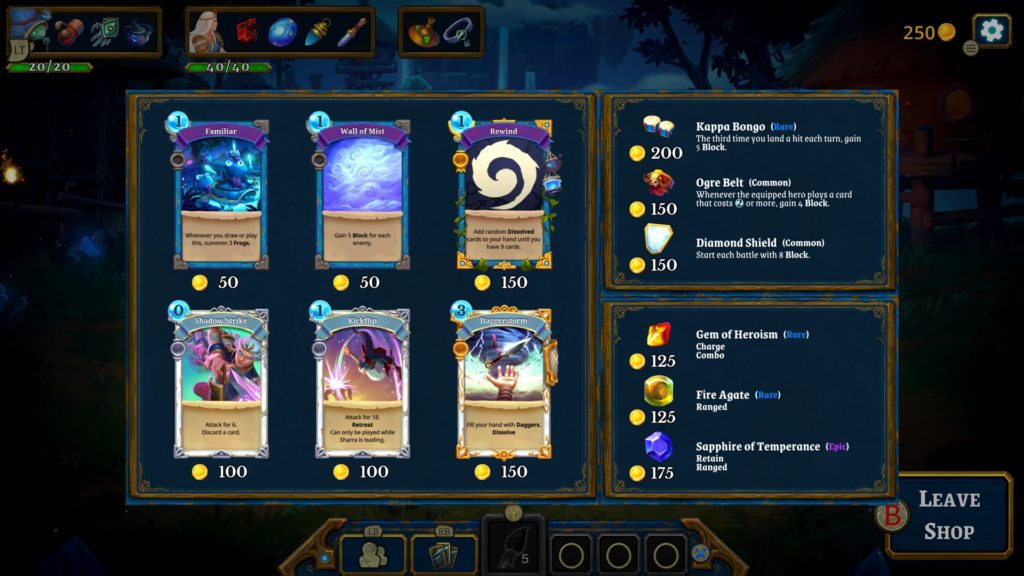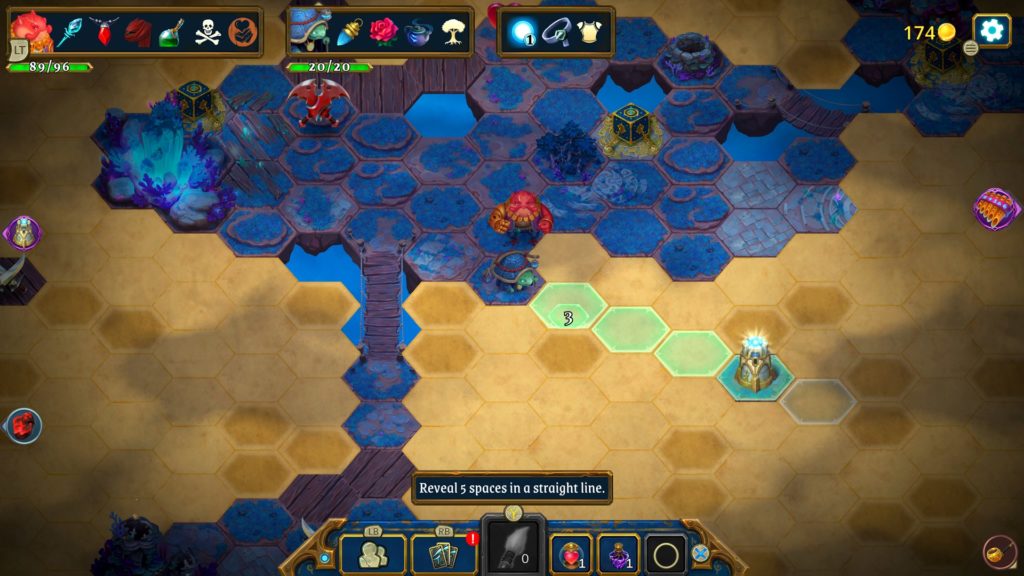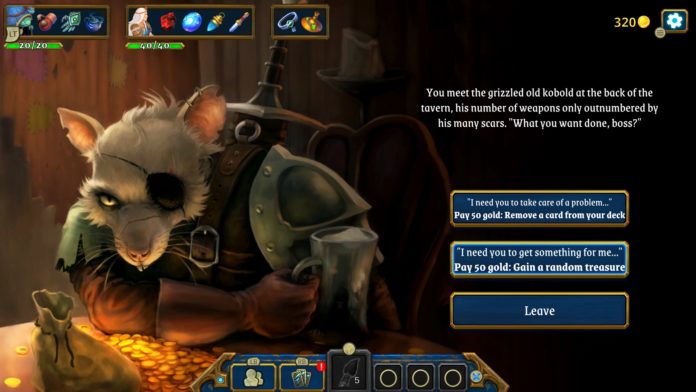REVIEW : Roguebook (XBOX Series X)
Gwent and Hearthstone are the first games that come to me when I think about card-based deck-building games. There’s a lot out there in the genre, but if you’re a deck-building lover, you should settle down and pay attention, since Roguebook surprised me, even as a casual follower of the game. Do you like Slay The Spire? What about the card game Magic: The Gathering? If so, Roguebook might be right up your alley, as it shares many key mechanics with Slay the Spire, but also has the backing of Richard Garfield, creator of Magic: The Gathering. Choose two characters, plan your strategy, and construct a great deck in this unexpected roguelike deck builder.

A normal Roguebook run will begin with players selecting their characters. The game allows two party members to journey together, which adds a lot of replayability and synergy to the game. Each of the characters works in the same way that mana colours do in Magic: The Gathering. So Seifer, who is a rat with a cursed arm in Roguebook, has cards that are red and black. The abilities correspond to many of the same roles that red and black provide in MTG. Seifer develops wrath for attacks, and his cards mainly work by injuring himself to deal more damage to adversaries.
Roguebook requires you to select two heroes to begin your adventure for that run, and as you advance through the pages and fight bosses, you’ll earn access to additional characters along the way. Each character has card decks that are tailored to their playstyle and employs entirely distinct setups and techniques. Different hero combinations will result in different card combinations and strategies, so it will take some time to figure out what works best for you. However, once you understand how to use their cards best to synergize with the other hero of choice, the magic of Roguebook will begin to shine through.

When you start a new run, you’re taken to an open page of Roguebook. The tiles on the grid, similar to the fog of war in other games, are where you can explore, trying to uncover as many tiles as you can for treasure, health, ink, and other items. You must employ the restricted paint brushstrokes that will uncover multiple tiles around you to uncover tiles that you cannot access. You only have a few of these paintbrushes, so select which route you want to attempt and uncover since there will be some towers or other uncovered spots in the fogged environment that will entice you to search in that direction. These towers will clear a big region of fog, therefore they are usually a good place to try to reach.
This ‘overworld’ feature elevates Roguebook above the average deck builder, and I enjoyed the exploration sections, which needed a strategy. Do you engage in a few normal battles (marked by crossed swords) or even mini-bosses (represented by red crossed swords) in the hopes of gaining some upgrades and gold to obtain better cards before the boss? What happens if you lose a lot of life? Health isn’t regenerated after battles, so if you didn’t locate any health refills while exploring the page, you might easily proceed to a boss fight and get destroyed very soon.
You’ll also notice that cards have open rune slots, which is how you may entirely personalise and upgrade your deck pretty significantly, which is going to be a must to fight the bosses with any purpose, especially in Chapters two and three.
Even more than the excitement of eventually winning, good roguelikes must provide a cause to return and desire to play more. Roguebook makes each run count since you receive persistent experience and unlocks as you complete each run, even if you fail to defeat chapter bosses. As you uncover the grid, look for pages/scrolls that may be used to buy permanent unlocks like perks and bonuses that will make each following run that much simpler. Heroes will level up over time and run, earning additional powerful and distinctive cards that can make a significant difference.

Battles are turned based, and what hasn’t been explained very effectively, in the beginning, is how the front and back positions of your heroes, as well as blocking, power, and other factors, play into strategy. The first instruction covers the fundamentals, but it will take a few attempts to grasp it and piece it together yourself. Your team members share the deck cards (albeit the cards are hero-specific), the block, and the mana (the amount it costs to play cards). Your front-line hero will usually bear the majority of your opponent’s attacks, therefore it’s critical to determine who will be in the front line to suffer the damage if you can’t fill your block sufficiently to neutralise the incoming damage.
Swapping heroes between the front and back play an important role in your strategy, as card values are sometimes dependent on their positioning as well. This is how you can begin to ‘combo’ cards, figuring out which sequence to play them in. You’ll also have some Ally summoning cards. Some of these extra perks can be kept for rapid heals or attacks on foes each turn. I changed my first strategies after discovering how powerful Bleed cards and Allies can be because while they cost more upfront, they work as essentially passive additional damage each round.

Roguebook is vibrant and colourful, with wonderful comic-inspired characters. The animation is good, and the soundtrack feels appropriate for the fantasy setting, almost as if you were going to open a book and travel inside. I’ll admit that as a casual deck building player, I was sceptical that Roguebook would hook me. I’m writing this review a week later because I keep wanting to do ‘one more run,’ continuously attempting to gain more cards and passives to make each game that much better. There’s plenty of replay value and length with plenty of strategies, post-game stuff if you complete the third Chapter and tonnes of options with a few heroes and 200 cards. A very different card game than I was used to or expecting, if you were a fan of Slay The Spire, you’ll most likely quite enjoy Roguebook for its polished and unique take on the genre. I don’t have much negative to say at all once you’ve figured out its intricacies and built some solid strategic foundations.
REVIEW : Planet Zoo: Wetlands Animal Pack (PC)














